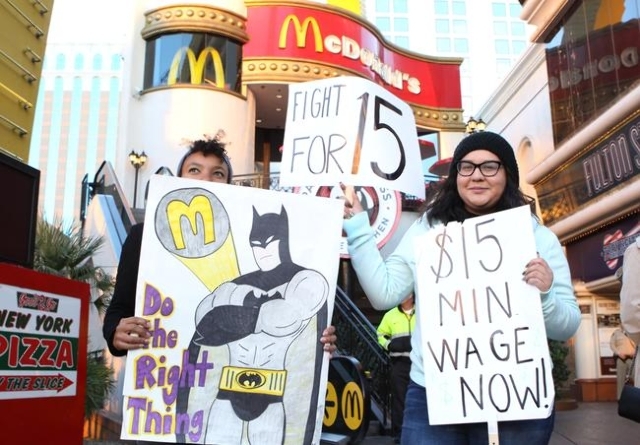EDITORIAL: Raising minimum wage wrong solution for income inequality
Income inequality is a big — if not the biggest — issue for Democrats in the current race for the White House, and helping those at the poverty level is their chief goal. To date, 29 states plus the District of Columbia have minimum wages above the national minimum of $7.25 an hour — a wage that both Hillary Clinton and Bernie Sanders would like to see increase substantially.
While those who support raising the minimum wage see it as a necessary step toward reducing poverty, a new Federal Reserve Bank research paper says a higher minimum wage would actually produce the opposite effect.
In the paper, David Neumark — a professor of economics and director of the Center for Economics and Public Policy at the University of California, Irvine, and a visiting scholar at the San Francisco Fed — argues that raising the minimum wage would do little in the war against poverty because, in part, relatively few Americans below the poverty level actually receive minimum wage.
"Setting a higher minimum wage seems like a natural way to help lift families out of poverty," Neumark writes. "However, minimum wages target individual workers with low wages, rather than families with low incomes."
According to the paper, roughly half of the 3 million or so workers receiving minimum wage are 16 to 24 years old, and the percentage of workers earning at or below the minimum is on the decline, falling from 6 percent in 2010 to 3.9 percent in 2014. Furthermore, many of those receiving minimum wage aren't poor. According to the paper, 57 percent of families below the poverty line contain no workers, while 46 percent of poor workers earn more than $10.10 an hour and 36 percent bring in more than $12 an hour. Instead of supporting periodic hikes to the minimum wage, Neumark says other policies such as earned income tax credits would better boost employment and reduce poverty among low-income families.
As we've pointed out time and time again, minimum wage jobs are intended for the least-skilled members of the workforce. These jobs are not intended to provide a so-called "living wage." They're meant to provide young people with initial work experience, or to provide a wage floor for tip-based positions. The higher the minimum wage, the more people are priced out of the workforce. It's already happening in cities where the minimum wage has been raised, and it will continue to happen.
The U.S. labor participation rate is the lowest it's been in decades. This campaign season, as we listen to candidates' rhetoric and head to the polls, we need to remember that even the slightest mandated raise in income will put even more people out of work. That's not what America needs.

















